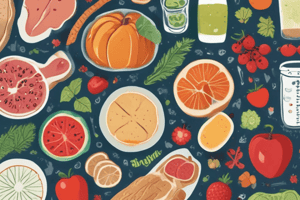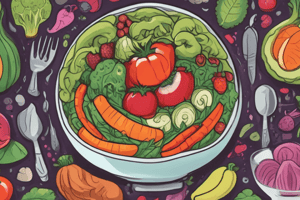Podcast
Questions and Answers
Cosa studia la nutrizione?
Cosa studia la nutrizione?
- L'ingegneria chimica
- La tecnologia alimentare
- La scienza del cibo e dei nutrienti che fornisce (correct)
- La biologia delle piante
Quali sono i macronutrienti essenziali per il nostro organismo?
Quali sono i macronutrienti essenziali per il nostro organismo?
- Proteine, Carboidrati, Grassi (correct)
- Antiossidanti, Acidi grassi, Acqua
- Zuccheri, Sodio, Colesterolo
- Fibre, Vitamine, Sali minerali
Qual è il ruolo principale dei carboidrati nel nostro corpo?
Qual è il ruolo principale dei carboidrati nel nostro corpo?
- Essere fondamentali per la coagulazione del sangue
- Fornire energia alle cellule, organi e muscoli (correct)
- Aiutare nella produzione di anticorpi
- Contribuire alla formazione degli ormoni
Qual è il compito dei grassi nel nostro organismo?
Qual è il compito dei grassi nel nostro organismo?
Qual è la funzione principale delle proteine nel nostro organismo?
Qual è la funzione principale delle proteine nel nostro organismo?
Cosa sono i micronutrienti?
Cosa sono i micronutrienti?
Cosa sono le vitamine?
Cosa sono le vitamine?
Secondo la guida MyPlate del Dipartimento dell'Agricoltura degli Stati Uniti, quanto della piastra dovrebbe essere occupato da frutta e verdura?
Secondo la guida MyPlate del Dipartimento dell'Agricoltura degli Stati Uniti, quanto della piastra dovrebbe essere occupato da frutta e verdura?
Quale tipo di grassi si dovrebbero preferire nella dieta secondo le linee guida sulla salute?
Quale tipo di grassi si dovrebbero preferire nella dieta secondo le linee guida sulla salute?
Qual è uno dei problemi comuni legati alla nutrizione menzionati nel testo?
Qual è uno dei problemi comuni legati alla nutrizione menzionati nel testo?
Quale cibo è considerato un'opzione proteica sana secondo il testo?
Quale cibo è considerato un'opzione proteica sana secondo il testo?
Perché molte persone trovano difficile mantenere una dieta sana, secondo il testo?
Perché molte persone trovano difficile mantenere una dieta sana, secondo il testo?
Study Notes
Understanding Food: A Journey Through Nutrition
Food is an essential component of our daily lives, fueling our bodies and providing the energy and nutrients we need to thrive. Yet, beneath the surface of a well-cooked meal, lies a complex web of science and biology known as nutrition. In this article, we'll delve into the fascinating world of food and nutrition, exploring the role of food in our health and well-being.
What is Nutrition?
Nutrition is the science of food and the nutrients it provides. It's the study of how the compounds in food interact with our bodies, providing the energy, nutrients, and other substances we need to stay healthy. Nutrients are the components in food such as proteins, carbohydrates, fats, vitamins, minerals, and water that are essential for our bodies' functions.
Macronutrients
Macronutrients are nutrients the body requires in relatively large amounts to perform its functions. They include:
- Proteins: Building blocks of body tissues, muscles, and organs, and are essential for growth and repair.
- Carbohydrates: The primary source of energy for our bodies, providing glucose that fuels cells, organs, and muscles.
- Fats: A source of energy and essential fatty acids, helping us absorb certain vitamins and maintain healthy skin, hair, and other body parts.
Micronutrients
Micronutrients are nutrients the body requires in relatively small amounts for various important functions. They include:
- Vitamins: Organic substances that help regulate body functions, such as metabolism, blood clotting, and immune response.
- Minerals: Inorganic substances, essential for maintaining various body functions, such as building bones, regulating fluid balance, and producing energy.
Balancing Nutrients
The key to a healthy diet is maintaining a proper balance of nutrients. The U.S. Department of Agriculture's MyPlate guide, for example, suggests that half of one's plate should be filled with fruits and vegetables, while the other half should contain a balance of whole grains, proteins, and dairy.
Healthy Eating: Common Nutrition Guidelines
Several common nutrition guidelines provide general advice for promoting health and preventing chronic diseases. Among these guidelines are:
- Fruits and Vegetables: Eat a variety of colorful fruits and vegetables daily, aiming for about 5 servings.
- Whole Grains: Consume whole grains, such as brown rice, whole wheat bread, and oats, instead of refined grains.
- Proteins: Include a variety of plant-based and animal-based proteins, such as legumes, nuts, fish, and poultry.
- Dairy: Choose low-fat dairy products, such as skim milk, yogurt, and cheese, or nondairy alternatives like fortified soy milk and almond milk.
- Fats: Opt for healthy unsaturated fats, such as those found in avocados, nuts, seeds, and fish, while limiting saturated and trans fats.
- Sugar: Be mindful of added sugars and aim to limit consumption.
Challenges in Nutrition
Despite the abundance of information and guidelines, many people still struggle with maintaining a healthy diet. Common challenges in nutrition include:
- Unhealthy Food Environments: Fast food and convenience stores may be abundant in communities, making it difficult to access healthy foods.
- Marketing and Advertising: Food companies often use marketing tactics to promote unhealthy foods, making it difficult to make informed decisions about diet.
- Time and Money: Preparing healthy meals can be time-consuming and expensive, challenging for people with limited resources.
- Lack of Knowledge: Many people lack basic knowledge about nutrition, making it difficult to make informed decisions about their diet.
Conclusion
The science of nutrition is complex, yet understanding its basic principles can help us make informed decisions about the food we eat. By balancing nutrients, choosing a variety of healthy foods, and being mindful of common challenges, we can work towards improving our diets and promoting overall health and well-being.
Studying That Suits You
Use AI to generate personalized quizzes and flashcards to suit your learning preferences.
Description
Explore the fascinating world of food and nutrition, diving into the science behind the nutrients that fuel our bodies. Learn about macronutrients, micronutrients, healthy eating guidelines, and common challenges in maintaining a nutritious diet.




